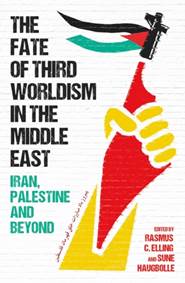The Fate of Third Worldism in the Middle East
Knihu kúpite v
1 e-shope
od
37,00 €
Knihyprekazdeho.sk
37,00 €
Skladom
(dodanie do 3 dní)
Krátky popis
In the latter half of the twentieth century, a revolutionary idea
promised to upend the global order. Anti-imperialist militancy,
bolstered by international solidarity, would lead to not only the
national liberation of oppressed peoples but universal
emancipation, shattering the division between the prosperous
nations of the capitalist West and the poorer countries of the
Global South. The idea was Third Worldism, and among others it
inspired struggles in Iran and Palestine. By the early 1980s,
however, progressive visions of independence and freedom had fallen
to the reality of an oppressive Islamic theocracy in Iran, while
the Palestinian Revolution had been eclipsed by civil war in
Lebanon, Israeli aggression and intra-Arab conflict. This
thought-provoking volume explores the dramatic decline of Third
Worldism in the Middle East. It reveals the lived realities of the
time by focusing on the key protagonists – from student activists
to guerrilla fighters, and from volunteer nurses to militant
intellectuals – and juxtaposes the Iranian and Palestinian cases to
offer a riveting re-examination of this defining era. Ultimately,
it challenges us to reassess how we view the end of the long 1960s,
prompting us to reconsider perennial questions concerning
self-determination, emancipation, change and solidarity.
&,nbsp, Contents Introduction: The Transformation of Third
Worldism in the Middle East Sune Haugbolle and Rasmus Elling 1
Demystifying Third World Solidarity: Cuba and the Palestinian
Revolution in the Seventies Sorcha Thomson 2 Nursing the
Revolution: Norwegian Medical Support in Lebanon as Solidarity,
1976–1983 Pelle Valentin Olsen 3 Searching for Friends Across the
Global South: Classified Documents, Iran, and the Export of the
Revolution in 1983 Simon Wolfgang Fuchs 4 The Gendered Politics of
Dead Bodies: Obituaries, Revolutionaries, and Martyrs between the
Iranian, Palestinian, and Dhufar Revolutions Marral Shamshiri 5
Brothers, Comrades, and the Quest for the Islamist International:
The First Gathering of Liberation Movements in Revolutionary Iran
Mohammad Ataie 6 Abu Jubran and Jabal ?Amil Between the Palestinian
and Iranian Revolutions Nathaniel George 7 The Islamic Republic
Party and the Palestinian Cause, 1979–80: A Discursive
Transformation of the Third Worldist Agenda Maryam Alemzadeh 8
Translation, Revolutionary Praxis, and the Enigma of Manuchehr
Hezarkhani Nasser Mohajer and Eskandar Sadeghi-Boroujerdi 9 The
Front of our Friends: Shu’un Falastiniyya as an Archive of
Palestinian Third Worldism Klaudia Wieser 10 Fragile Solidarity:
The Iranian Left and the Kurdish National Question in the 1979
Revolution Rasmus C. Elling and Jahangir Mahmoudi 11 The ‘Ends’ of
the Palestinian Revolution in the Fakhani Republic Sune Haugbolle
Afterword: Towards a Praxis-Centred Historiography of Middle East
Third Worldism Toufoul Abou-Hodeib and Naghmeh Sohrabi

